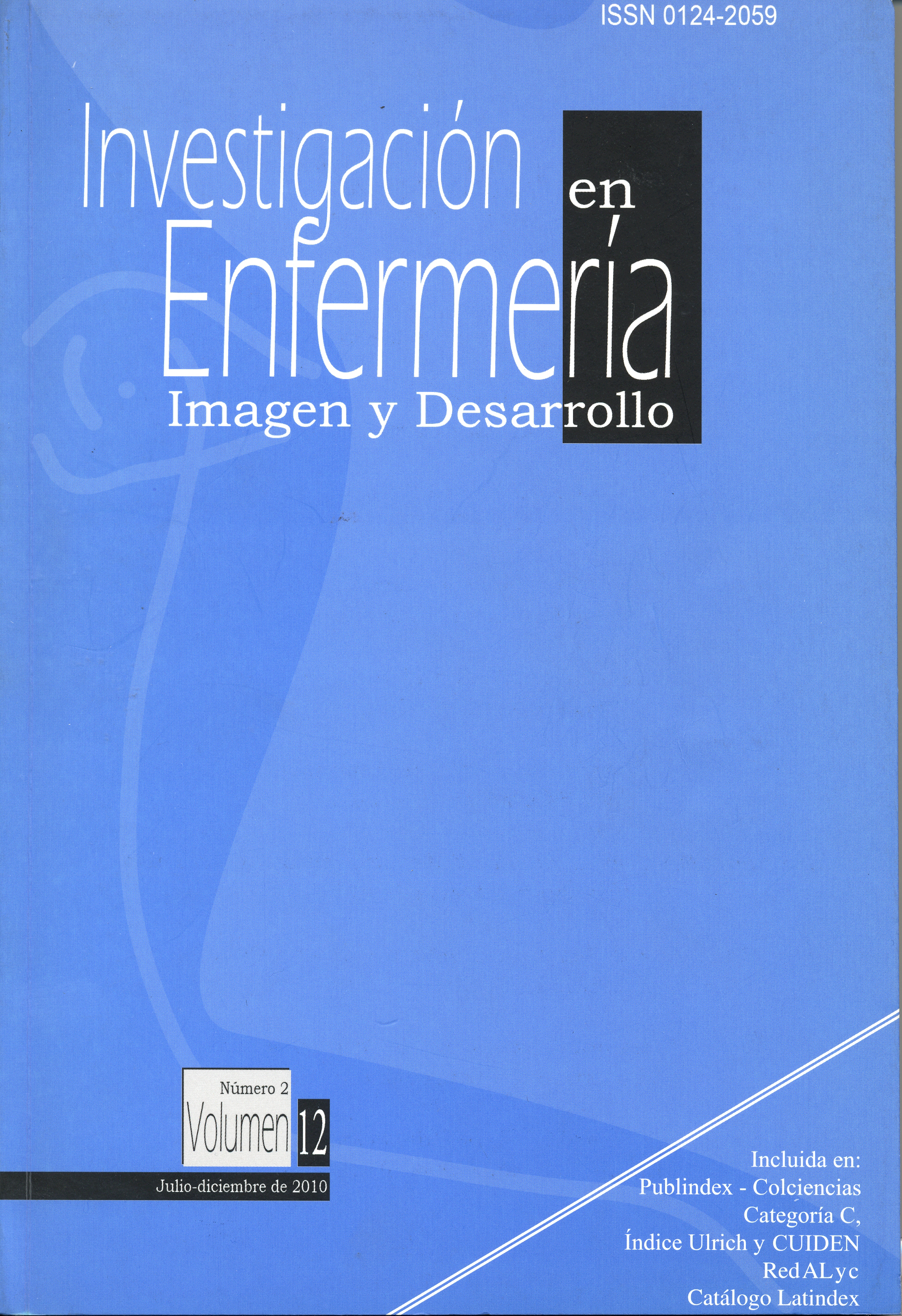Abstract
Este artículo presenta parte de los resultados de la investigación titulada: Comprendiendo el cuidado de los ancianos en situación de discapacidad y pobreza.El objetivo es describir y analizar el significado que dan a la vejez y a la discapacidad las personas ancianas de un área urbana marginal de Bogotá, desde la perspectiva cultural.
Este es un estudio cualitativo, que utilizó la etnografía de tipo interpretativo. Los datos fueron recolectados mediante observación participante y entrevistas en profundidad. Los colaboradores fueron 39 hombres y mujeres ancianos con algún tipo de discapacidad.
El análisis de datos consideró la propuesta de M. Leininger, de donde emergieron tres temas culturales: (a) uno se da cuenta de sus males, porque el cuerpo no le sirve como antes; (b) la vejez: muchas enfermedades y pocas capacidades, y (c) invalidez dejando la vida en manos de otros.
El significado de la vejez y la discapacidad en las personas ancianas es una construcción social y cultural que tiene una fuerte influencia de factores religiosos, de clase social, de valores, que lleva a pensar que no se puede hablar de personas viejas o con discapacidad como un grupo homogéneo; por lo tanto, se requiere comprender cómo interpreta cada población la vejez y la discapacidad, para poder romper esquemas de cuidado y de rehabilitación homogéneos, en la mayoría de los casos, centrados en aspectos biológicos y en las deficiencias para avanzar a modelos que respeten y promuevan las capacidades haciendo demandas específicas acordes con la diversidad cultural.
ABSTRACT
This article presents part of the results of a research Project called: Understanding the care of elderly people in disability and poverty situations. The objective is to describe and analyze the meaning of old age and disability, given by elderly people in a marginal urban area of Bogota, Colombia, from a cultural perspective.
This qualitative study made use of interpretive Ethnography. The data were gathered through participant observation and interviews in depth. The contributors were 39 elderly women and men with some kind of disability. The analysis of the data took M. Leininger’s proposal of the following three cultural topics into consideration: (a) one realizes his/her illness, because body is not as useful as before, (b) old age: many diseases and few capabilities, and (c) disability… living one’s life in the hands of the others.
The meaning of old age and disability in elderly people is a socio-cultural construction -with strong influence from religion, social class factors and values- that leads to think it is not possible to conceive elderly or disabled people as an homogeneous group. Therefore, it is required to understand the way each population conceives old age and disability in order to break homogeneous rehabilitation and care schemes —which in most of the cases are centered in biological aspects and deficiency— in order to advance to capabilities respectful and promoting models, making specific demands in accordance with cultural diversity.
La revista Investigación en Enfermería. Imagen y Desarrollo se encuentra registrada bajo la licencia Creative Commons Reconocimiento 4.0 Internacional. Por lo tanto, esta obra se puede reproducir, distribuir y comunicar públicamente en formato digital, siempre que se reconozca el nombre de los autores y a la Pontificia Universidad Javeriana. Se permite citar, adaptar, transformar, autoarchivar, republicar y crear a partir del material, para cualquier finalidad (incluso comercial), siempre que se reconozca adecuadamente la autoría, se proporcione un enlace a la obra original y se indique si se han realizado cambios. La Pontificia Universidad Javeriana no retiene los derechos sobre las obras publicadas y los contenidos son responsabilidad exclusiva de los autores, quienes conservan sus derechos morales, intelectuales, de privacidad y publicidad.
El aval sobre la intervención de la obra (revisión, corrección de estilo, traducción, diagramación) y su posterior divulgación se otorga mediante una licencia de uso y no a través de una cesión de derechos, lo que representa que la revista y la Pontificia Universidad Javeriana se eximen de cualquier responsabilidad que se pueda derivar de una mala práctica ética por parte de los autores. En consecuencia de la protección brindada por la licencia de uso, la revista no se encuentra en la obligación de publicar retractaciones o modificar la información ya publicada, a no ser que la errata surja del proceso de gestión editorial. La publicación de contenidos en esta revista no representa regalías para los contribuyentes.


